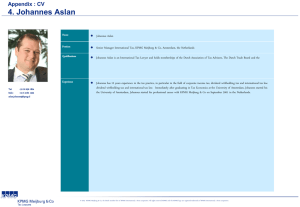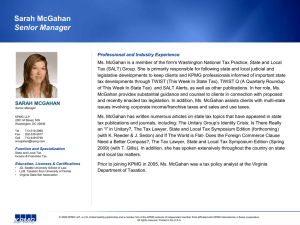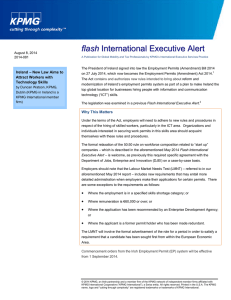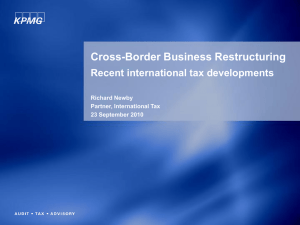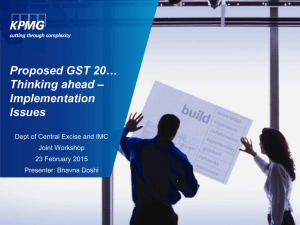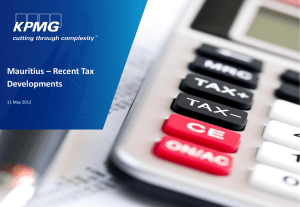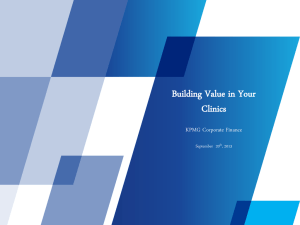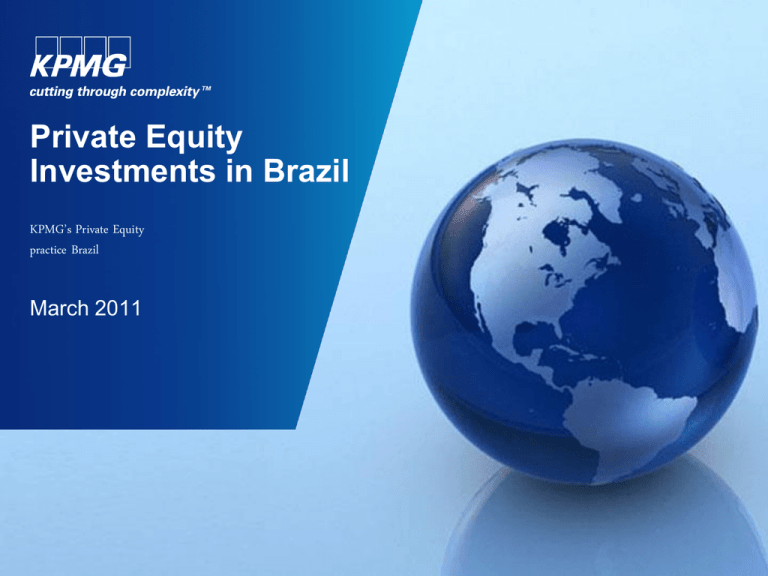
Private Equity
Investments in Brazil
KPMG’s Private Equity
practice Brazil
March 2011
With you today
Roberto Haddad
Tax Partner at KPMG
Rio de Janeiro
Contact details:
T: +55 21 3515 9469
robertohaddad@kpmg.com.br
Roberto is the lead international
and M&A tax partner in the Rio de
Janeiro office and the National tax
lead partner for the Private Equity/
Energy and Oil & Gas areas.
© 2011 KPMG Assessores Tributários, a Brazilian entity and a member firm of the KPMG
network of independent member firms affiliated with KPMG International Cooperative (“KPMG
International”), a Swiss entity. All rights reserved.
Country overview
Country overview
The facts you should know
The seventh largest economy in the world
Currency fluctuations and inflation have been under control for more than 10
years
Strong financial and capital market systems
Brazil became investment grade by Standard & Poor’s, Fitch Ratings and
Moody’s
Highly developed Industrial Park
A stronger middle class is rapidly forming in Brazil avid to consume
Brazil’s economy is riding the worldwide boom in raw material/commodities
Significant new offshore oil discoveries (including deep water drilling - presalt)
Local alternative energy technology (ethanol-based and others)
Brazil will host the FIFA World Cup in 2014 and the Olympic Games in 2016
© 2011 KPMG Assessores Tributários, a Brazilian entity and a member firm of the KPMG
network of independent member firms affiliated with KPMG International Cooperative (“KPMG
International”), a Swiss entity. All rights reserved.
Country overview
Main taxes in Brazil
Income Tax
Social Contribution
PIS and COFINS
25%
Variable
9% or
15%
WHT
15% or
25%
9.25% or
3.65%
CIDE
10%
IPI (Federal VAT)
Variable
ICMS (State VAT)
Variable
© 2011 KPMG Assessores Tributários, a Brazilian entity and a member firm of the KPMG
network of independent member firms affiliated with KPMG International Cooperative (“KPMG
International”), a Swiss entity. All rights reserved.
Import Tax
IOF tax
ISS (Municipal tax)
Variable
(0.38%,
2%-6%)
2 to 5%
Country overview
The facts you should know
Brazil is not an OECD-member
Brazil has an extensive treaty network but no treaty with the UK, US,
Germany and Switzerland
Brazilian TP rules are not OECD-based
Brazil has recently introduced thin-cap rules
All reporting and invoices moving to electronic/online (SPED, e-invoice)
No tax consolidation available
© 2011 KPMG Assessores Tributários, a Brazilian entity and a member firm of the KPMG
network of independent member firms affiliated with KPMG International Cooperative (“KPMG
International”), a Swiss entity. All rights reserved.
5
How to structure
your investment
in Brazil?
How to structure your investment in Brazil?
Holding structure
Main drivers
Investor
Offshore sale
Premium opportunity when including a
vehicle owned by the non resident investor to
acquire target (genuine business purpose)
Holding B
Abroad
Investment route through Law 4,131
Brazil
Premium
IOF tax (0.38%)
Holding C
Tax treaties
Tax havens
Downstream
merger
Opco
© 2011 KPMG Assessores Tributários, a Brazilian entity and a member firm of the KPMG
network of independent member firms affiliated with KPMG International Cooperative (“KPMG
International”), a Swiss entity. All rights reserved.
Dividends
Interest on net equity
Capital gains
7
How to structure your investment in Brazil?
FIP structure
Investors
Investors
Investors
Tax efficient vehicle
No taxation at fund level (flow-through entity)
A
B
C
Income and capital gains received by the FIP
are usually not subject to WHT in Brazil
No WHT on disposal or amortization of FIP
Abroad
Brazil
FIP
Holding
Shares and
dividends must
not exceed 40%
limit
Target Co.
quotas for non-residents that hold up to 40%
of interest and that are not located in a low
tax jurisdiction
Premium opportunity when including a
vehicle owned by the FIP to acquire Target
Investment route through Resolution 2,689
IOF tax (2% on the inflow of funds and 0% on
capital repatriation)
Just corporations (S/A)
© 2011 KPMG Assessores Tributários, a Brazilian entity and a member firm of the KPMG
network of independent member firms affiliated with KPMG International Cooperative (“KPMG
International”), a Swiss entity. All rights reserved.
8
How to structure your investment in Brazil?
Target – what to acquire?
Main Drivers
Assets
Indirect taxes
Inherited liabilities may result, if assets
purchased be defined as commercial, industrial
or professional establishment
Main tax attributes not transferred to buyer
Depreciation of acquired assets
More complex from commercial, regulatory and
legal standpoint
© 2011 KPMG Assessores Tributários, a Brazilian entity and a member firm of the KPMG
network of independent member firms affiliated with KPMG International Cooperative (“KPMG
International”), a Swiss entity. All rights reserved.
Shares
Avoid indirect taxes
Tax and labor responsibility on past
contingencies
Possibility to utilize NOLs
Model usually suggested by sellers
Possibility to utilize tax-deductible amortization
of Premium (PPA necessary)
9
How to structure your investment in Brazil?
Capital repatriation
Dividends
No WHT on dividends
IOF zero-rated
No tax deduction in Brazil
Trapped cash – no repatriation until
sufficient earnings to pay dividends
Interest on net equity
Interest deduction for Corporate
Income Tax in Brazil
IOF zero-rated
WHT of 15% on interest (25% to tax
haven)
Trapped cash / Limitation: 50% of
current profits/ Profits reserve
± Treatment on beneficiary country
© 2011 KPMG Assessores Tributários, a Brazilian entity and a member firm of the KPMG
network of independent member firms affiliated with KPMG International Cooperative (“KPMG
International”), a Swiss entity. All rights reserved.
Interest on loan
Interest deduction for Corporate
Income Tax in Brazil (subject to thin
cap rules)
WHT of 15% on interest (25% to tax
haven)
Exit
Brazilian Fund (“FIP”)
Disposal of Brazilian company: No WHT
Disposal of FIP: No WHT (40% of minimum shares/
dividends)
Non resident Investor
Disposal of a Brazilian company: 15% of WHT (25%
when paid to tax haven)
Brazilian Holding
Disposal of Brazilian company: 34% of CIT
10
How to structure your investment in Brazil?
Low-tax jurisdictions & Privileged tax regimes
Low-tax jurisdictions
Andorra
United Arab Emirates
Panama
Anguilla
French Polynesia
Pitcairn Island
Ascension Island
Gibraltar
American Samoa
Antigua and Barbuda
Granada
Samoa
Netherlands Antilles
Hong Kong
San Marino
Aruba
Kiribati
Islands of St. Helen
Bahamas
Labuan
St. Kitts and Nevis
Bahrain
Lebanon
St. Lucia Island
Barbados
Liberia
St. Pierre and Miquelon Island
Belize
Liechtenstein
St. Vincent and the Grenadines
Bermuda
Macau
Seychelles
Brunei
Madeira
Solomon Islands
Campione d’Italia
The Maldives
Swaziland
Channel Islands
Isle of Man
Oman
Cayman Islands
Marshall Islands
Queshm Island
Cyprus
Mauritius
Tonga
Singapure
Monaco
Turks and Caicos Islands
Cook Islands
Montserrat
Vanuatu
Costa Rica
Nauru
American Virgin Islands
Djibouti
Niue Island
British Virgin Islands
Dominica
Norfalk Island
Privileged tax regimes
Holding companies in Luxembourg and
Denmark
“Sociedad Anonima Financiera de
Inversion (Safis)” in Uruguai
International Trading Companies (ICTs) in
Iceland
Offshore KFTs in Hungary
State Limited Liability Companies (LLCs)
in the US
“Entidad de Tenencia de Valores
Extranjeros” (ETVEs) in Spain*
International Holding Company (IHC) in
Malta
Holding companies in The Netherlands*
* Effects suspended
© 2011 KPMG Assessores Tributários, a Brazilian entity and a member firm of the KPMG
network of independent member firms affiliated with KPMG International Cooperative (“KPMG
International”), a Swiss entity. All rights reserved.
11
How to structure your investment in Brazil?
Low-tax jurisdictions & Privileged tax regimes
Higher WHT rate / Stronger rules
Type of transaction
• Capital gain on disposal of investments (Route
4,131)
• Royalties
• Interest
• Interest on equity
• Transfer pricing
• Thin capitalization
• FIP
• Capital gain on investment on Brazilian Financial and
Stock markets (Res. 2,689)
© 2011 KPMG Assessores Tributários, a Brazilian entity and a member firm of the KPMG
network of independent member firms affiliated with KPMG International Cooperative (“KPMG
International”), a Swiss entity. All rights reserved.
Low-tax jurisdiction
Privileged tax regime
?
?
?
12
How to structure your investment in Brazil?
Funding through debt
Debt
Thin Capitalization rules: debt/ equity ratio of
Holding A
2:1, or reduced to only 30% if the lender is
located in a tax haven or under a privileged tax
regime
Interest
INE
Abroad
Foreign exchange gains or losses impact
Brazil
Interests payments are subject to withholding
Premium
income tax (WHT) at the rate of 15% (25% in
case of tax havens)
Holding B
Debt
Downstream
Merger
Opco
Interest deductible for Corporate taxes (if
related to company’s activities)
Guarantee of foreign currency parameter
IOF of 0% on inflow of loan (5.38% if less than
90 days)
Debt pushdown: inherent risk
Debt + Premium structure = Negative Net
equity / NOLs?
© 2011 KPMG Assessores Tributários, a Brazilian entity and a member firm of the KPMG
network of independent member firms affiliated with KPMG International Cooperative (“KPMG
International”), a Swiss entity. All rights reserved.
13
How to structure your investment in Brazil?
Funding through equity
Equity
Holding A
No impact from exchange variations / no foreign
currency parameter
INE
Increases capability to pay Interest on net
Dividends
Abroad
equity
Presents a more wealthy financial situation
Brazil
Premium
Capital reduction – more complex (only if there
Holding B
Downstream
Merger
is capital in excess or to absorb retained losses;
and need of 60 to 90 days to be implemented)
IOF of 0.38% on inflow of capital
Opco
© 2011 KPMG Assessores Tributários, a Brazilian entity and a member firm of the KPMG
network of independent member firms affiliated with KPMG International Cooperative (“KPMG
International”), a Swiss entity. All rights reserved.
14
Additional
Comments
Additional comments
Tax planning
• Debate on anti-avoidance regulations
• Substance over form precedents
• Business reason requirement
•5-6 years statute of limitations
© 2011 KPMG Assessores Tributários, a Brazilian entity and a member firm of the KPMG
network of independent member firms affiliated with KPMG International Cooperative (“KPMG
International”), a Swiss entity. All rights reserved.
16
Additional comments
Special tax incentives
Some tax incentives available:
For specific geographical locations – in the north and northeast of Brazil, a reduction of 75 per
cent in corporate income tax may be allowed
For strategic industrial sectors - ethanol, semiconductor devices, oil & gas, etc
Local R&D investments
Investments in infrastructure projects (Provisional Measure 517/2010)
In general lines, income paid by special purpose entities (incorporated to implement infrastructure
projects), arising from debentures previously issued, is exempt from withholding income tax when paid to
Brazilian individuals. When the income is paid to Brazilian entities, the tax is reduced to 15 percent.
Non-residents may benefit from a zero-rated withholding income tax on income received from investment
funds, which have at least 85 per cent of their equity invested in debentures issued by entities involved in
infrastructure projects (not applicable for investors located in low tax jurisdictions)
REIDI
Created to stimulate investment in infrastructure. REIDI grants a suspension of the PIS and Cofins (social
contributions) for entities involved in infrastructure projects in the following sectors: transportation, ports,
energy, sanitation, irrigation and for construction of ducts.
© 2011 KPMG Assessores Tributários, a Brazilian entity and a member firm of the KPMG
network of independent member firms affiliated with KPMG International Cooperative (“KPMG
International”), a Swiss entity. All rights reserved.
© 2011 KPMG Assessores Tributários, a Brazilian entity and a member firm of the KPMG network of independent
member firms affiliated with KPMG International Cooperative (“KPMG International”), a Swiss entity. All rights
reserved.
The information contained herein is of a general nature and is not intended to address the circumstances of any
particular individual or entity. Although we endeavor to provide accurate and timely information, there can be no
guarantee that such information is accurate as of the date it is received or that it will continue to be accurate in the
future. No one should act on such information without appropriate professional advice after a thorough examination of
the particular situation. The disclosure of this document to third parties is forbidden.

